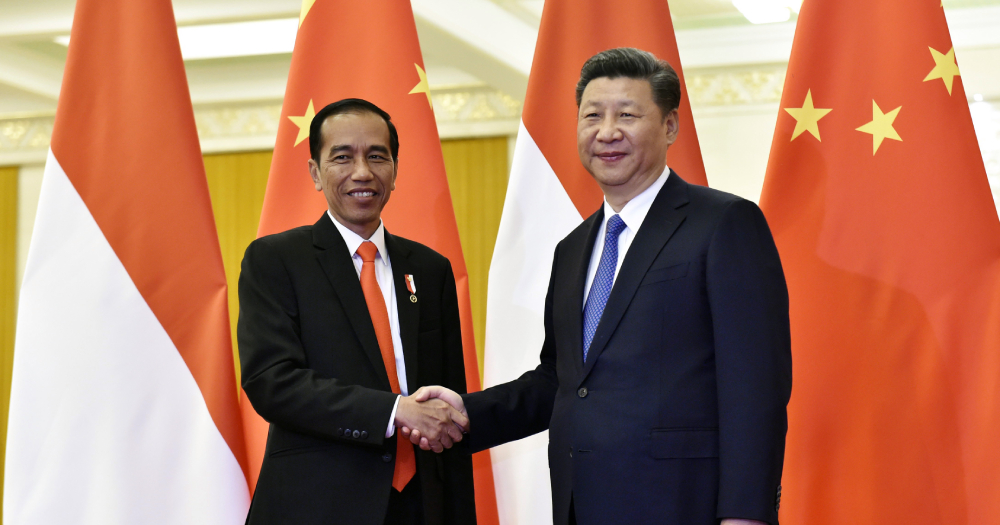Indonesians are heading to the polls on April 17 to vote for their next president.
China-backed projects under scrutiny
And as the economy and bread and butter issues take centre stage, Chinese investments in the country have come under scrutiny as well.
Both candidates, the incumbent Joko Widodo, also known as Jokowi, and former army general Prabowo Subianto, steered clear of the issue at the presidential debate that took place on March 30.
But Prabowo made Indonesia's relations with China a key election issue the last time they met in 2014.
Prabowo, who vowed to "seek a better deal" in trade with China, had said that while he welcomes Chinese investment, it must also benefit Indonesia, according to Bloomberg.
He had also promised to review BRI projects in the country should he be elected.
High-speed rail hampered by delays
One of the BRI projects in question is the Jakarta-Bandung high-speed rail -- a high-profile project that is meant to boost Indonesia's infrastructure development.
The US$6 billion (S$8.1 billion) project is funded by loans from China Development Bank.
It is expected to cut the travel time between Jakarta and Bandung from three to five hours to just 45 minutes, according to Caixin Global.
But the project has been hit by delays, and even members of Widodo's own administration have raised their concerns regarding it.
Tom Lembong, Indonesia's investment chief, told Bloomberg that the high-speed train project is "deeply troubled".
"It's opaque and non-transparent -- even us cabinet members are having trouble getting data and information."
Nevertheless, he said he still supports China's plans for its Belt and Road Initiative (BRI).
Growing reliance on China?
The Indonesian government under Widodo has agreed to offer projects worth a whopping US$91 billion (S$123.1 billion) as part of the country's participation in China BRI.
The projects would be executed in four different locations -- North Sumatra, North Kalimantan, North Sulawesi and Bali.
Widodo is also expected to attend a Belt and Road summit hosted by Chinese President Xi Jinping in April.
The leader of the world's largest Muslim-majority country had also refrained from commenting on the controversial issue of the incarceration of Muslims and ethnic Uyghurs in Xinjiang by the Chinese authorities, a decision that analysts say is made to avoid offending Beijing and to protect Chinese investments in the country.
The flip side
However, the welcoming of Chinese investments have opened Widodo up to criticisms.
While accepting financial funding from China would help bring jobs and government revenue, such ties with Beijing might also fuel perceptions that Indonesia is becoming increasingly indebted to China.
Moreover, there have already been reports on rising anti-Chinese sentiments in areas where Chinese workers were hired to work on the existing projects.
And this might not bode well for Widodo's campaign.
Growing skepticism towards Chinese investments?
Questioning deals with China is not a new strategy for opposition politicians when it comes to rallying against the incumbents in election campaigns.
Malaysian Prime Minister Mahathir Mohamad raised doubts about the benefits that China-backed infrastructure projects can potentially bring to the country, and proceeded to cancel a few pipeline projects after he took office.
Across the world in Brazil, far-right Jair Bolsonaro won the presidential election in October in 2018 after criticising Chinese involvement in the country's economy.
And in the Maldives, Abdulla Yameen, the pro-China former president, was voted out of office in August 2018.
Thereafter, the new administration pledged to pursue an "India-first" foreign policy, a move that was seen as a pointed rebuke to Beijing.
In Pakistan, China-backed infrastructure projects have come under intense criticism from local leaders, who say they have not reaped the full benefits of such developments.
Closer to home, Myanmar had scaled back plans for a China-backed port project that was initiated under the previous military regime, due to fears of mounting debt to China.
China cleaning up BRI's image
In response to growing skepticism towards its BRI ambitions, China has stepped up its management of overseas investments, in an attempt to burnish the programme's image after the backlash it has received, Bloomberg reported.
Chinese President Xi Jinping has also often promoted the BRI as an opportunity for "win-win cooperation" with all partners involved, for "mutual benefit" on both sides.
Top image via Kenzaburo Fukuhara - Pool/Getty Images
If you like what you read, follow us on Facebook, Instagram, Twitter and Telegram to get the latest updates.
